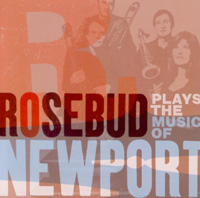
CD 9194-2 |
Rosebud Plays The Music Of Newport
Beate Sampson - vocals
Geoff Goodman - guitar
Till Martin - saxophone
Johannes Herrlich - trombone
|
|
|
Rosebud Plays the Music of the Newport Folk Festival is an ingenious reworking of songs from the American folk and blues traditions, a harmonic, melodic, improvised remoulding of those traditions into a more modern mythos.
Conceived in 1959 by Newport Jazz Festival founder George Wein, and American folk music icon Pete Seeger, the Newport Folk Festival celebrated the depth and diversity of the American folk tradition. The festival enjoyed only a handful of glory years; during those years Peter Paul and Mary, Joan Baez , Judy Collins, and Bob Dylan became stars, and the careers of such country blues legends as Son House, Mississippi John Hurt, and Howlin’ Wolf were resurrected. But by the mid 1960’s the festival and the folk music movement had reached its apogee. The Beatles-led British invasion brought a new relevancy to rock and roll, and Bob Dylan’s brashly irreverent performance of “Maggie’s Farm” at the 1965 Newport Festival signalled which way the wind was blowing. Dylan’s electric apostasy symbolized the beginning of the end of the folk movement as America’s mainstream muse. But the music had re-planted its seeds in the rich loam of America’s youth, and would directly and indirectly influence the culture, politics, and music of the generation growing up in the 1960’s and 70’s.
Geoff Goodman grew up in that generation, and its influence rings true in his music. The birth of the concept for the current CD is a true case of serendipity. Goodman had chanced upon Murray Lerner’s film documenting the Newport Folk Festival’s halcyon years from 1963 through 1966. With the film’s images in mind, Geoff got out an old book of photos by David Gahr, “The Face of Folk Music”, highlighting Newport. It was around the same time that Goodman began talking about his desire to sketch, and paint. His eye turned inexorably towards Gahr’s book with its myriad of expressive faces, some young and expectant, filled with the passion of the moment, others lined with the sorrow and soulful reflection of a life hard-lived, and he began to sketch and then paint faces from the book’s photos.
Around this time Goodman and saxophonist Till Martin were thinking about coming up with a new project for The Rosebud Trio. The trio had grown out of Goodman’s and Martin’s desire to come up with a trio sound that was both unusual and flexible. Geoff had always been fascinated by saxophonist-clarinetist Jimmy Giuffre’s Trios, especially the one with valve trombonist Bob Brookmeyer, and guitarist Jim Hall; the two decided on a similar instrumental combination, and they both felt that trombonist Johannes Herrlich was the right man for the job. Their initial project revolved around film music and cowboy songs, and is documented on the CD “ Rosebud Trio Plays Jazz, Film Music, and Cowboy Songs”. As for the new project, Geoff’s re-kindled interest in American folk music set off the spark of an idea to once again delve into a music that covers the gamut of the American experience.
Folk music is essentially the story of a people in song, and Geoff immediately felt he knew the story-teller. Geoff had worked with Beate Sampson in various jazz settings, and “…I know she also has a real folk music vein – plus she would give the music the kind of modern interpretation we had in mind.” Sampson was enthusiastic; “Geoff gave me the first songs, and I was immediately drawn in. When Son House sings “Death Letter” I understand what he’s saying; it’s the same with Elisabeth Cotten. There is an honesty and humility in the music that allows me to be myself (that I feel deeply drawn to).”
In the proceeding months Geoff began researching for material; “The program grew out of songs that I had played when I was a kid – “Freight Train”, for instance. I also went back into my record collection, re-listening to people like Dock Boggs and Son House.” The band began to narrow down the possibilities until they had arrived at the choice of the 14 songs on this CD.
Folk is the music’s heartbeat; diversity and innovation is Rosebud’s lifeblood. Solos and duos and trios in every combination; dynamics ranging from delicate simplicity to muscular polyphony – Rosebud has somehow found a way to create an incredibly expansive sound out of two horns, voice, and guitar or banjo. The genius of this music is that it shines a new light on the folk tradition, augmenting and at times transforming it. Perhaps more to the point; Rosebud Plays the Music of Newport is simply a joy to listen to.
|